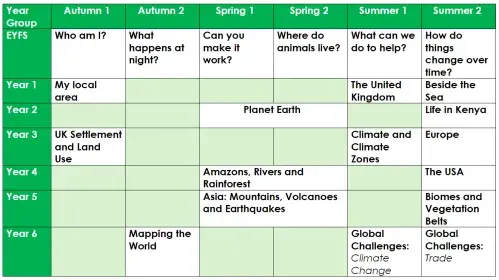Why do we learn geography?
We aim to inspire in pupils a curiosity and fascination about the world and its people. Our Geography curriculum is designed to impart knowledge about diverse places, people, resources and the natural and human environments together with a deep understanding of the Earth’s key physical and human processes.
Geographical knowledge, understanding and skills provide the frameworks and approaches that explain how the Earth’s features at different scales are shaped, interconnected and change over time.
Our approach
The sequence of learning starts with the world pupils know: their own local environment followed by the United Kingdom (Year 1). As they progress, their growing knowledge about the world should help them to deepen their understanding of the interaction between physical and human processes, and of the formation and use of landscapes and environments.
In Year 2, we expand the pupil’s knowledge and understanding to the whole of the planet; they learn to locate and name the seven continents and the five oceans as well as focussing in on a contrasting location (Kenya) and comparing that with their own local area.
In Key stage 2 Pupils extend their knowledge and understanding beyond the local area to include the United Kingdom and Europe (Year 3), North and South America (Year 4). This will include the location and characteristics of a range of the world’s most significant human and physical features. They should develop their use of geographical knowledge, understanding and skills to enhance their locational and place knowledge.
In Upper Key stage 2, pupils go on to study Asia and some of the natural characteristics of the area (including an in depth study into volcanoes and the Pacific ring of fire) They the impact humans are having upon the planet and significant Global challenges including climate change and deforestation.
Units are carefully scheduled so that they build on what has been taught before across History and Geography. For example, in Year 3, children look at the geography of Europe before learning about Ancient Greece. This locational knowledge helps in making connections and deepening understanding.
- Image

